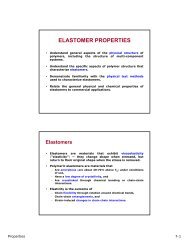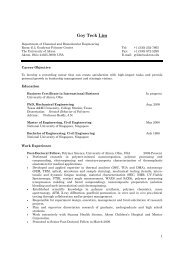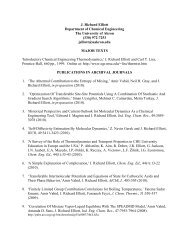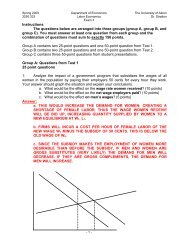Sociology of the Anarchists - Gozips.uakron.edu - The University of ...
Sociology of the Anarchists - Gozips.uakron.edu - The University of ...
Sociology of the Anarchists - Gozips.uakron.edu - The University of ...
Create successful ePaper yourself
Turn your PDF publications into a flip-book with our unique Google optimized e-Paper software.
Fur<strong>the</strong>r, <strong>the</strong> focus upon anarchists after N30 centered only on <strong>the</strong> black bloc (and property<br />
destruction), and not, as Crass (2001) noted, all <strong>the</strong> o<strong>the</strong>r activities anarchists were<br />
involved in:<br />
While <strong>the</strong> media obsessed over anarchists who destroyed<br />
property – <strong>the</strong> real story was that anarchists were simply<br />
everywhere doing a hundred different things. <strong>Anarchists</strong><br />
were doing jail support, media work, making meals for<br />
thousands, doing dishes, facilitating strategy meetings,<br />
leading workshops and discussion groups. <strong>Anarchists</strong> were<br />
doing medical support work, security at <strong>the</strong> warehouse<br />
space, communications between affinity groups and<br />
clusters, organizing marches and blockades and lock downs<br />
and tripod sits and forming human chains. <strong>Anarchists</strong> were<br />
making puppets, banners, signs, leaflets, press releases,<br />
stickers, and costumes (like <strong>the</strong> lovable sea turtles).<br />
<strong>Anarchists</strong> were starting chants, designing posters and<br />
newspapers, playing music, negotiating with <strong>the</strong> police and<br />
jailers to get our comrades out <strong>of</strong> jail. <strong>Anarchists</strong> were<br />
squatters occupying an empty building and attracting<br />
national media to <strong>the</strong> issues <strong>of</strong> property, poverty and<br />
homelessness. <strong>Anarchists</strong> were held in solitary confinement<br />
for being such effective organizers <strong>of</strong> mass non-violent civil<br />
disobedience that rocked Seattle and ignited <strong>the</strong><br />
imaginations <strong>of</strong> <strong>the</strong> world. <strong>Anarchists</strong> organized child<br />
care!!! And yes anarchists targeted corporate chainstores.<br />
Simply put, anarchists significantly contributed to one <strong>of</strong><br />
<strong>the</strong> most effective mass actions in recent US history. (p. 9)<br />
Gillham and Marx (2000) detail various structural and protester-police interaction-related<br />
ironies and ten effects which <strong>the</strong>y argue helped produce <strong>the</strong>m in Seattle: spill-over or fly<br />
paper, reciprocal and neutralizing, escalation, non-enforcement, excitement, role reversal,<br />
strange bedfellows, secrecy, prior reform, and value conflict effects. <strong>The</strong>y write:<br />
“Authoritarian societies are defined by order without liberty. Yet democratic societies can<br />
only exist with both liberty and order” (p. 229, emphasis in <strong>the</strong> original). As such, <strong>the</strong>y<br />
suggest that not all demonstrations must end in violence or a revocation <strong>of</strong> civil liberties.<br />
However, <strong>the</strong>ir general premise overlooks <strong>the</strong> fact that in Seattle DAN knowingly risked<br />
police violence and <strong>the</strong> removal <strong>of</strong> its “rights” in order to physically stop <strong>the</strong> WTO<br />
meetings. For example, Gillham and Marx suggest that <strong>the</strong> authorities could have<br />
established “clearly defined (reasonably contiguous) protest and no-protest zones before<br />
<strong>the</strong> event” (p. 227) in order to ensure <strong>the</strong> “delegate's freedom <strong>of</strong> movement”. DAN<br />
intended to stop <strong>the</strong> meetings and in <strong>the</strong> process to deny delegates <strong>the</strong> freedom <strong>of</strong><br />
movement, since <strong>the</strong>y thought that allowing delegates to meet would produce a more<br />
violent result that <strong>the</strong> revocation <strong>of</strong> <strong>the</strong>ir freedom <strong>of</strong> movement. Thus, Gillham and Marx<br />
ignore that <strong>the</strong> compromises <strong>the</strong>y advocate clearly conflict with <strong>the</strong> goals <strong>of</strong> DAN, just as<br />
<strong>the</strong> goal <strong>of</strong> police is to repress dissent that endangers capital and State. <strong>The</strong> above<br />
suggestion would benefit capital and State more than DAN.<br />
[ Williams 91 ] [ this is a draft. do not cite. ]






